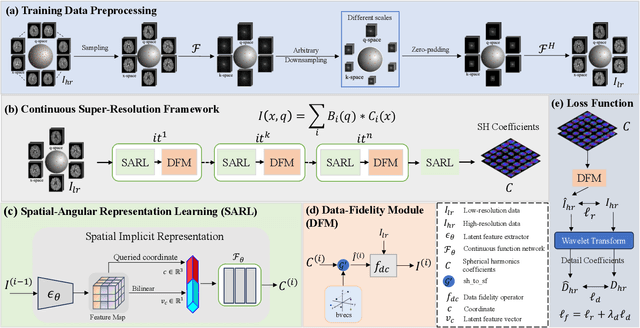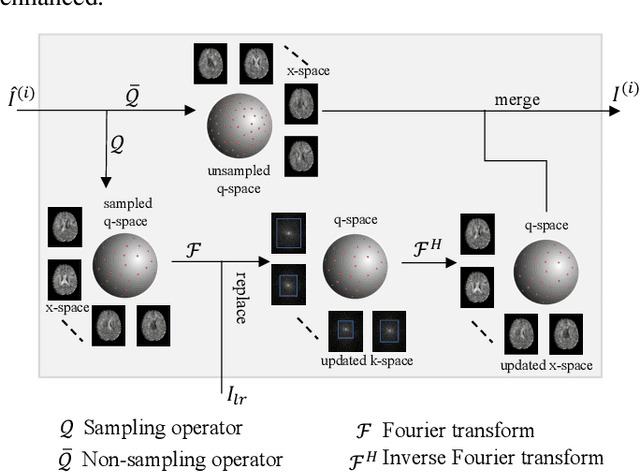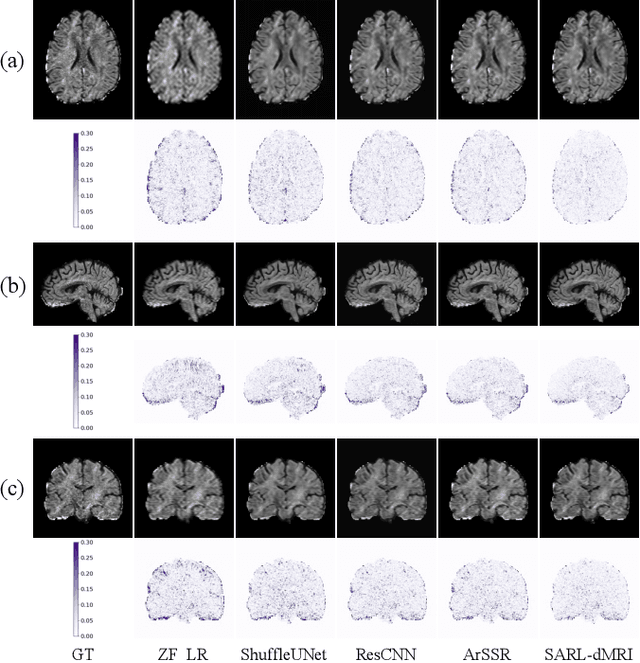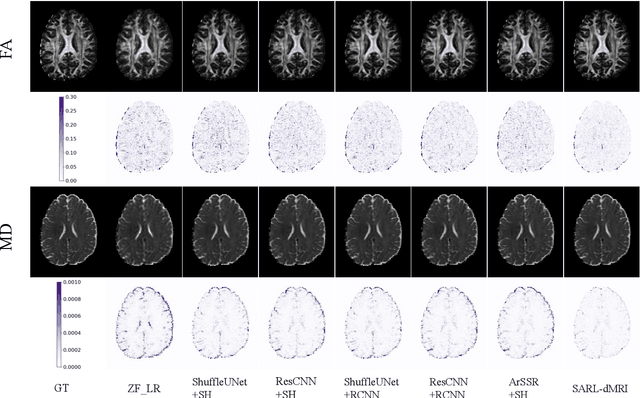Hua Guo
Predicting Neo-Adjuvant Chemotherapy Response in Triple-Negative Breast Cancer Using Pre-Treatment Histopathologic Images
May 20, 2025Abstract:Triple-negative breast cancer (TNBC) is an aggressive subtype defined by the lack of estrogen receptor (ER), progesterone receptor (PR), and human epidermal growth factor receptor 2 (HER2) expression, resulting in limited targeted treatment options. Neoadjuvant chemotherapy (NACT) is the standard treatment for early-stage TNBC, with pathologic complete response (pCR) serving as a key prognostic marker; however, only 40-50% of patients with TNBC achieve pCR. Accurate prediction of NACT response is crucial to optimize therapy, avoid ineffective treatments, and improve patient outcomes. In this study, we developed a deep learning model to predict NACT response using pre-treatment hematoxylin and eosin (H&E)-stained biopsy images. Our model achieved promising results in five-fold cross-validation (accuracy: 82%, AUC: 0.86, F1-score: 0.84, sensitivity: 0.85, specificity: 0.81, precision: 0.80). Analysis of model attention maps in conjunction with multiplexed immunohistochemistry (mIHC) data revealed that regions of high predictive importance consistently colocalized with tumor areas showing elevated PD-L1 expression, CD8+ T-cell infiltration, and CD163+ macrophage density - all established biomarkers of treatment response. Our findings indicate that incorporating IHC-derived immune profiling data could substantially improve model interpretability and predictive performance. Furthermore, this approach may accelerate the discovery of novel histopathological biomarkers for NACT and advance the development of personalized treatment strategies for TNBC patients.
Spatial-Angular Representation Learning for High-Fidelity Continuous Super-Resolution in Diffusion MRI
Jan 27, 2025



Abstract:Diffusion magnetic resonance imaging (dMRI) often suffers from low spatial and angular resolution due to inherent limitations in imaging hardware and system noise, adversely affecting the accurate estimation of microstructural parameters with fine anatomical details. Deep learning-based super-resolution techniques have shown promise in enhancing dMRI resolution without increasing acquisition time. However, most existing methods are confined to either spatial or angular super-resolution, limiting their effectiveness in capturing detailed microstructural features. Furthermore, traditional pixel-wise loss functions struggle to recover intricate image details essential for high-resolution reconstruction. To address these challenges, we propose SARL-dMRI, a novel Spatial-Angular Representation Learning framework for high-fidelity, continuous super-resolution in dMRI. SARL-dMRI explores implicit neural representations and spherical harmonics to model continuous spatial and angular representations, simultaneously enhancing both spatial and angular resolution while improving microstructural parameter estimation accuracy. To further preserve image fidelity, a data-fidelity module and wavelet-based frequency loss are introduced, ensuring the super-resolved images remain consistent with the original input and retain fine details. Extensive experiments demonstrate that, compared to five other state-of-the-art methods, our method significantly enhances dMRI data resolution, improves the accuracy of microstructural parameter estimation, and provides better generalization capabilities. It maintains stable performance even under a 45$\times$ downsampling factor.
Diff5T: Benchmarking Human Brain Diffusion MRI with an Extensive 5.0 Tesla K-Space and Spatial Dataset
Dec 09, 2024

Abstract:Diffusion magnetic resonance imaging (dMRI) provides critical insights into the microstructural and connectional organization of the human brain. However, the availability of high-field, open-access datasets that include raw k-space data for advanced research remains limited. To address this gap, we introduce Diff5T, a first comprehensive 5.0 Tesla diffusion MRI dataset focusing on the human brain. This dataset includes raw k-space data and reconstructed diffusion images, acquired using a variety of imaging protocols. Diff5T is designed to support the development and benchmarking of innovative methods in artifact correction, image reconstruction, image preprocessing, diffusion modelling and tractography. The dataset features a wide range of diffusion parameters, including multiple b-values and gradient directions, allowing extensive research applications in studying human brain microstructure and connectivity. With its emphasis on open accessibility and detailed benchmarks, Diff5T serves as a valuable resource for advancing human brain mapping research using diffusion MRI, fostering reproducibility, and enabling collaboration across the neuroscience and medical imaging communities.
Robust Simultaneous Multislice MRI Reconstruction Using Deep Generative Priors
Jul 31, 2024



Abstract:Simultaneous multislice (SMS) imaging is a powerful technique for accelerating magnetic resonance imaging (MRI) acquisitions. However, SMS reconstruction remains challenging due to the complex signal interactions between and within the excited slices. This study presents a robust SMS MRI reconstruction method using deep generative priors. Starting from Gaussian noise, we leverage denoising diffusion probabilistic models (DDPM) to gradually recover the individual slices through reverse diffusion iterations while imposing data consistency from the measured k-space under readout concatenation framework. The posterior sampling procedure is designed such that the DDPM training can be performed on single-slice images without special adjustments for SMS tasks. Additionally, our method integrates a low-frequency enhancement (LFE) module to address a practical issue that SMS-accelerated fast spin echo (FSE) and echo-planar imaging (EPI) sequences cannot easily embed autocalibration signals. Extensive experiments demonstrate that our approach consistently outperforms existing methods and generalizes well to unseen datasets. The code is available at https://github.com/Solor-pikachu/ROGER after the review process.
Simultaneous Multi-Slice Diffusion Imaging using Navigator-free Multishot Spiral Acquisition
Jul 30, 2024Abstract:Purpose: This work aims to raise a novel design for navigator-free multiband (MB) multishot uniform-density spiral (UDS) acquisition and reconstruction, and to demonstrate its utility for high-efficiency, high-resolution diffusion imaging. Theory and Methods: Our design focuses on the acquisition and reconstruction of navigator-free MB multishot UDS diffusion imaging. For acquisition, radiofrequency (RF) pulse encoding was employed to achieve Controlled Aliasing in Parallel Imaging (CAIPI) in MB imaging. For reconstruction, a new algorithm named slice-POCS-enhanced Inherent Correction of phase Errors (slice-POCS-ICE) was proposed to simultaneously estimate diffusion-weighted images and inter-shot phase variations for each slice. The efficacy of the proposed methods was evaluated in both numerical simulation and in vivo experiments. Results: In both numerical simulation and in vivo experiments, slice-POCS-ICE estimated phase variations more precisely and provided results with better image quality than other methods. The inter-shot phase variations and MB slice aliasing artifacts were simultaneously resolved using the proposed slice-POCS-ICE algorithm. Conclusion: The proposed navigator-free MB multishot UDS acquisition and reconstruction method is an effective solution for high-efficiency, high-resolution diffusion imaging.
East: Efficient and Accurate Secure Transformer Framework for Inference
Aug 19, 2023



Abstract:Transformer has been successfully used in practical applications, such as ChatGPT, due to its powerful advantages. However, users' input is leaked to the model provider during the service. With people's attention to privacy, privacy-preserving Transformer inference is on the demand of such services. Secure protocols for non-linear functions are crucial in privacy-preserving Transformer inference, which are not well studied. Thus, designing practical secure protocols for non-linear functions is hard but significant to model performance. In this work, we propose a framework \emph{East} to enable efficient and accurate secure Transformer inference. Firstly, we propose a new oblivious piecewise polynomial evaluation algorithm and apply it to the activation functions, which reduces the runtime and communication of GELU by over 1.5$\times$ and 2.5$\times$, compared to prior arts. Secondly, the secure protocols for softmax and layer normalization are carefully designed to faithfully maintain the desired functionality. Thirdly, several optimizations are conducted in detail to enhance the overall efficiency. We applied \emph{East} to BERT and the results show that the inference accuracy remains consistent with the plaintext inference without fine-tuning. Compared to Iron, we achieve about 1.8$\times$ lower communication within 1.2$\times$ lower runtime.
 Add to Chrome
Add to Chrome Add to Firefox
Add to Firefox Add to Edge
Add to Edge